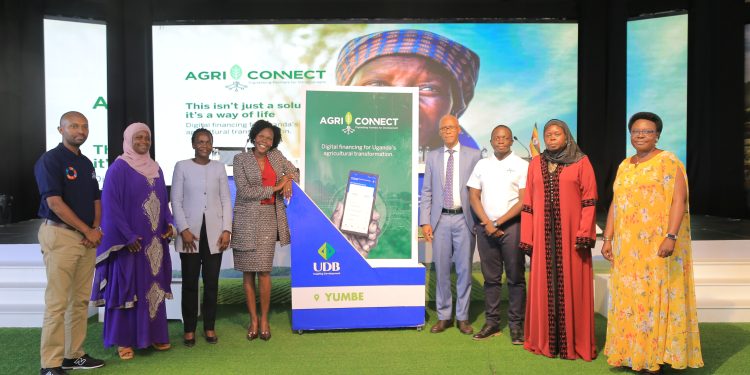A Fintech solution dubbed “AgriConnect” was launched on Monday in Yumbe district to ease access to digital financing for smallholder farmers in Uganda.
AgriConnect is the first digital solution which can offer both a savings and lending option for small-holder farmers in Uganda.
The innovation, the first digital solution which can offer both a savings and lending option for small-holder farmers in Uganda, will provide a platform for Village Saving and Loans Associations (VSLAs) to digitally access short-term seasonal loans and saving products at affordable rates to grow their businesses.
The entire lending process – application, approval, and disbursement – will be done digitally with the funds credited directly to the farmer’s e-mobile wallet.
It was made possible through a partnership between Uganda Development Bank (UDB), Ensibuuko, European Union, United Nations Capital Development Fund (UNCDF), and the Food and Agriculture Organisation (FAO).
Speaking at the launch of Uganda’s first-ever digital agricultural loan for savings groups, Gerald Otim, the CEO at Ensibuuko, said such purposeful collaborations are important for financial inclusion and will go a long way in validating the maturity of Uganda’s fintech landscape.
On her part, Patricia Ojangole the Managing Director of Uganda Development Bank said the innovative Fintech solution is aimed at disseminating credit to the mass lower underserved markets consequently driving financial and digital inclusion.
“The world is fast evolving resultant of advancements in technology, and it is key that as a development finance partner, we recognize such changes and make a deliberate effort to back inventions that influence the growth of key sectors of the economy like Agriculture, which employs 68% of the country’s population.”
She said the pilot project targets to reach at least 1,000 smallholder farmers.
The farmers will have access to digital loans to enable them to increase production, intensify food security, and boost the household incomes of the farming communities across Uganda. Learnings from the pilot will enable the implementers to scale the solution to impact more farmers with a target of 18,000 at full cycle.
Ojangole urged the smallholder farmers in Yumbe District and the neighbouring areas to embrace this service which will boost their output and participation in agribusiness and called for more meaningful partnerships.
Uganda’s scope of financial services encompassed by Fintech has steadily been increasing and this has been necessitated by network readiness, digital literacy, and mobile phone penetration.
According to World Bank, Uganda ranks 172nd on Gross National Income (GNI) and 116th on the Network Readiness Index (NRI), respectively.
The country’s Mobile penetration is at 49% and smartphone adoption is at 16%; all of which account for the contribution of the digital economy which contributes 7% to the economy.
The State Minister of Finance for Investment and Privatization, Hon Evelyn Anite, said over the last few decades, digitalization has transformed the way of life world-over, causing varied social and economic changes.
“Likewise, in Uganda, digitalization continues to take root in shaping various sectors, specifically financial services. AgriConnect will reinvigorate and reshape our country Uganda. This indeed is a timely product for Uganda,” she pointed out.
She added: “With services like this, Uganda is indeed on a good trajectory to achieve its goals as stipulated in the National Development Plan and Vision 2040.”
Hon. Anite lauded UDB, FAO, UNCDF, EU and Ensibuuko for their critical role in the socio-economic transformation of Uganda and pledged the government’s continued support towards this agenda.
Speaking at the same evet, UNCDF Technical Advisor – Inclusive Digital Economy, Richard Ndahiro, reaffirmed their commitment towards boosting financial inclusion in Uganda.
“UNCDF has been involved in advancing access to finance through digital financial services in Uganda for the last seven years. We have seen solutions like digital payments and savings accounts grow significantly in various agri-value chains. The promise of digitalization unlocking financing for farmers still falls behind – yet it holds the greatest value proposition for them,” Ndahiro said.
He added: “According to Findex 2021, digital financial services have enabled more Ugandans to access formal financial services. 66% of Ugandan adults are estimated to have access to an account. However, while 77% of Ugandans borrow money – only 31% borrow from a formal financial institution. Smallholder farmers are top of the list of those excluded from access to formal borrowing. The solution launched today leverages digital innovation to enable access to finance for farmers. This project is one of the ways UNCDF is working with partners and financial services providers to drive digital financial inclusion beyond payments.”
FAO’s Country Representative in Uganda, Dr Antonio Querido, believes AgriConnect will enhance the agriculture sector and improve farmer livelihoods in Uganda.
“FAO believes that Public funding alone is not enough to tackle the world’s most pressing sustainable development challenges – from ending poverty and hunger by 2030 to reducing inequalities. Private investments that generate social or environmental benefits alongside returns can help fill that investment gap. The pilot solution we are launching today is hoped to boost sustainable private investments in the agri-food sector and improve farmers’ access to digital credit,” said Querido.
The European Union expressed delight in the partnership mentioning that it will set the tone for further deeper and more sustainable collaboration in the future, benefitting underserved populations.









